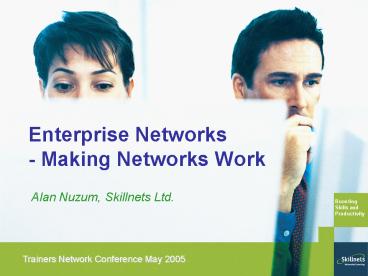Enterprise Networks Making Networks Work - PowerPoint PPT Presentation
1 / 14
Title:
Enterprise Networks Making Networks Work
Description:
Characteristics of Networks ... Medical Devices. Healthcare Practitioners. Leisure Facilities. Hotels & Restaurants. Manufacturing ... – PowerPoint PPT presentation
Number of Views:37
Avg rating:3.0/5.0
Title: Enterprise Networks Making Networks Work
1
Enterprise Networks- Making Networks Work
- Alan Nuzum, Skillnets Ltd.
Boosting Skills and Productivity
Trainers Network Conference May 2005
2
Skillnets Mission
- To improve learning activity in the workplace
leading to enhanced skills, employability and
competitiveness. - Focus on workers - people in employment
- Private sector firms
- Open to all sectors, regions companies sizes
- Particular priority is small/medium businesses
Trainers Network Conference May 2005
3
Training Networks Programme
Integrates Networking benefits With Best
practice training development
KEY PRINCIPLES Enterprise-led approach
Mobilisation of groups of enterprises Active
participation Co-investment Best training
practice Needs driven Innovation Added
Value
Trainers Network Conference May 2005
4
Networks are.
The coming together of a group of enterprises of
whatever size, to use their combined talents and
resources to achieve results that would not be
possible if the enterprises operated
individually. (US NET) the pattern of formal
and informal linkages between individuals,
businesses and other organizations such as
government and voluntary agencies Blundel and
Smith (2001) Networks are not the same as
networking
Trainers Network Conference May 2005
5
Characteristics of Networks
- Contact from low to high-level networking but
contact is typically informal and
non-contractual. - Reciprocity - a willingness to exchange
information, know-how, propriety knowledge and
goods. - Trust - a willingness to risk placing faith in
the reliability of others. - Learning - a recognition that knowledge develops
and best-practice should be learnt. - Partnership being prepared to commit to
specific and long-term business relationships. - Decentralism realisation that centralised
information and decision-processing is
inefficient.
Trainers Network Conference May 2005
6
What can networks do?
- Material Benefits Firms can increase sales and
lower production costs by working together. - Reduced costs/buying power
- Greater efficiency
- Responsibilities resources shared
- Customisation of training to group needs
- Administrative and development support,
expertise, resources - Higher quality training
- Enhanced image/exposure
- New business opportunities
- Psychological Benefits As firms eliminate their
isolation they learn that their problems are
shared by others. - Reducing isolation
- Mutual support/sounding boards
- Peer Interaction/discussion
- Motivation momentum
- Belonging/shared purpose
- More likely to try new things (innovation)
Trainers Network Conference May 2005
7
What can networks do? (contd)
- Developmental Benefits By promoting interaction
with other firms, networking increases learning
and the ability to adapt to the changing economic
environment. - New information and options
- Expanded range of learning opportunities
- Inter-firm learning
- Access to industry expertise
- Shared development of new approaches/products/tool
s - Shared commissioning new courses, occupational
standards, certification - Benchmarking access to best practice role
models - Faster innovation
- Improved analytical and strategic thinking
Trainers Network Conference May 2005
8
Features of Networks
- Unifying Purpose
- Independent Members
- Voluntary Links
- Multiple Leaders
- Integrated Levels
Trainers Network Conference May 2005
9
How Networks Operate
- Task- the aims of the network - what it hopes to
achieve and the issues around that - Process- the way the network acts as a unit and
not as a loose alliance. For example how the
steering group takes key decisions - Delivery- the way that the activities of the
network are delivered, based on the decisions of
the steering group
- Key Elements
- Network Agreement
- Network Plan
- Network Structure
- Agreed Rules and Procedures
- Decision Making Processes
Trainers Network Conference May 2005
10
- Why do firms join Networks?
- Added-value or perceived value (what do I get
from this?) - Opportunity for growth and personal achievement
- Recognition
- Responsibility
- Why do firms leave?
- Lack of time
- Failure to identify with the network
- Lack of clarity as to the goals of the network
- Changing business circumstances
- Perceived lack of benefit / network not meeting
needs - Personal and family matters.
Trainers Network Conference May 2005
11
Key Success Factors
- Strong enterprise leadership
- Effective facilitation importance of
institutional thickness - a necessary condition
for successful networks. interventions must be
measured and sensitive to the needs of specific
network forms. (DTI 2001) - Openness and trust
- Focused goals that are understood, agreed and
shared by all the members - Clear and measurable economic benefits for firms
- Early and tangible results vitality of a business
network is critical to its overall performance.
This is partly dependent on the rate of entry and
exit of firms. (DTI 2001) - Commitment and participation
- Action/Interaction balance
Trainers Network Conference May 2005
12
A Skillnet (Training Network)
Awards Bodies
Trainers
Education
Member Company
Member Company
Expert/policy Groups
Member Company
Member Company
Member Company
Member Company
Member Company
Member Company
Trainers Network Conference May 2005
13
Skillnets Training Networks Programme
- Sectors
- Transport Logistics
- Clothing and Textiles
- Plastics
- Textiles Clothing
- Retailers
- Services
- Tourism
- Printing Publishing
- Construction
- Electronics
- Food
- Information Technology
- Medical Devices
- Healthcare Practitioners
- Leisure Facilities
- Hotels Restaurants
- Manufacturing
- Food producers
- Regions
- Donegal (north west)
- Galway (west)
- Mayo (west)
- Border Counties
- Carlow/ Kilkenny (midlands)
- Waterford (South East)
- Mallow (South East)
- Cork (South)
- Limerick (West)
- Lietrim (North West)
- Dublin (East)
- Network Promoters
- Individual Companies
- Special network companies
- Trade associations
- Industry Federations
- Chambers of Commerce
- Trades Unions
- Employer/Union partnerships
Trainers Network Conference May 2005
14
Skillnets Strategy 2005-2010
Trainers Network Conference May 2005































